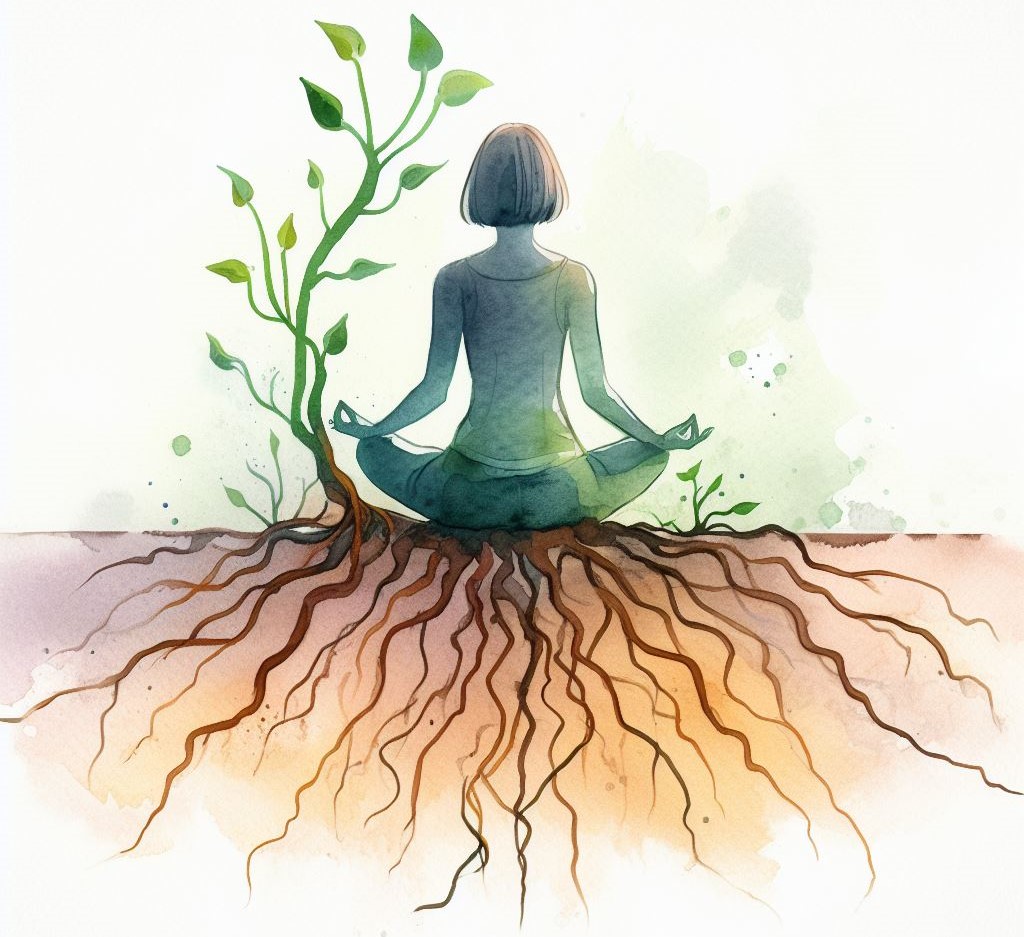In an age where everything moves with a sense of urgency, it has become more important than ever to ground yourself. This is to remain mentally and emotionally composed, regardless of what happens around you.
One thing many of us are lacking these days is balance (or steadiness). In other words, we need equanimity more than ever, otherwise, we get lost in a haywire of ideas, beliefs, thoughts, and feelings. In other words, we lack any real foundation and forget what truly matters.
Luckily, there are many helpful practices to get out of your head and into your body. That’s exactly what we’re going to look at here: Why it’s so important to be grounded, and how to do it.
Why groundedness is helpful

Think of grounding as getting into your body when you’re trapped in your head. The more grounded you are, the more present and connected to your body you feel.
Grounded: Being deeply connected to the physical world
Ungrounded: Being deeply connected to the mental or ethereal at the expense of the physical
There’s so much happening in our lives all the time, that it’s easy to get swept away by it all. We’re all trying to figure life out and feel stressed sometimes. Social media constantly lures our attention while we get caught up in thinking, postulating, planning, and doing.
In our world, there are a lot of things that stimulate the mind, and at times it can all be a little much.
When the realm of mind occupies us all the time, we can feel stressed. We can become anxious, overwhelmed, or burnout. The mind can be a tormenting place, and the only thing you can do to navigate these challenges is bring it back to the now…
To your breath. To the sights and smells. To the sensations you’re feeling.
As a nomadic traveler, learning to ground myself has been a pillar of my well-being because nothing in my life is stable. I could spend my entire life thinking about where it may lead me, or what I must do next.
But that’s the best way to miss the whole thing.
Learning how to ground myself when everything feels a little intense allows me to return to Earth and realize that everything is fine.
Now, I don’t get swept away in coulds, woulds, and shoulds. I don’t excessively worry or panic. I deal with the situation at hand practically and avoid thinking about what could be.
Instead of thinking that you’re above it all, groundedness is the embodiment that you’re a strange, messy, irrational creature, and there’s nothing at all wrong with that.
Why you need to be grounded in reality
Noways, when the lines are being blurred because of what is objectively true and what isn’t, we need to be rational and consider possibilities.
If there’s one thing I see now more than ever, it’s people getting carried away with theories, ideas, and ideologies. It seems that less people are taking the middle ground, and as a result, we’re losing ourselves in a world of conflicting information.
Let’s face it, a lot is happening in the world. Many theories may be true, and many things could be. Of course, it’s important to keep an open-mind, but to also have some unbiased discernment.
The world isn’t falling apart right beneath your feet. You still have food, water, and shelter. I’m not suggesting to stick your head in the sand, but it’s just as important not to get too carried away with what could be.
Concern yourself with the tangible objective reality you’re dealing with right now rather than ideas and concepts that haven’t actualized yet. We can speculate that many things will happen, but if we become too disconnected from the now, then we can end up making some bad life choices.
Learning how to be factual and as unbiased as possible even though you have personal beliefs is critical. When you can’t divide a belief from reality, your world will turn upside down.
Therefore, acknowledge everything you hear but take it with a grain of salt. Speak from your perspective, rather than an objective standpoint: ‘I believe we’re inching towards World War Three’ rather than perceiving it as an objective reality.
Common traits of grounded people
Here are common traits of grounded people, and reasons why cultivating groundedness will improve the quality of your life.
- Centered: People who are grounded are not easily shaken from their course. They can keep a level head in most situations and don’t stress about the little things.
- Focused: Someone who is grounded isn’t easily distracted or caught off guard. They have a single point of focus rather than being scatterbrained.
- Emotionally stable: People who are grounded tend to be more emotionally stable. They have a grip on their emotions.
- Rational: People who are grounded tend to be rational. This means they’re generally realistic, as they’re more concerned about what needs to happen to move forward.
- Calm: When people are grounded, they are generally quite calm. This means they’re not as likely to get triggered or agitated. Things that are seen as a big deal to some people aren’t so much to them.
- Mindful: Someone who is grounded is generally present. This means they don’t spend much time dwelling on the past or future and aren’t too concerned with hypotheticals.
- Embodied: Someone who is grounded is more connected to their physical body and attentive to what it’s telling them.
What happens when you're not grounded?

Being ungrounded means you’re disconnected from reality. I’m sure you’ve had moments where you’ve been somewhat detached from the reality of the situation, whether you’re disassociating from a painful outcome, or smearing it with a facade of positivity.
This often leads to a cluttered mind, stress, worry, overwhelm, and panic. People who aren’t grounded tend to make irrational decisions and poor choices because they’re not present with the situation at hand. With that said, emotional instability and incessant thinking happen when you’re not grounded.
As groundedness is to keep a cool head in difficult situations, it’s often the other way around when people aren’t. Ungrounded people are more affected by trivial matters such as what other people think of them, or how much money they make.
Ungrounded people are:
- Disconnected from reality
- Mentally scattered
- Overstimulated
- Flustered or overwhelmed
- Stressed over trivial matters
- Unfocused
- Disassociated
- Exhausted
- Burnt out
Why you're ungrounded
- You’re overstimulating yourself
- You’re juggling too many things at the same times
- You’re not emotionally stable
- You spend too much time consuming media
- You spend too much time on social media
- Your values are superficial
- You’re cooped up in the same environments
- You don’t take enough time for relaxation
- You excessively think
- You put too much energy into hypotheticals
- You tend to run away form your issues
- You’re not being your authentic self
How to become more grounded

When you’re getting caught in your head, bring it back to what you have right now. Slowly reel in your mind by focusing on what’s tangible and immediate.
Do you have fresh water? check.
Do you have food? Check.
Do you have shelter? Warmth? Companionship?
Identifying your current needs brings clarity, and helps you make sense of what you need. Mindfulness is the key here.
You can practice mindfulness any time, with any activity. Next time you’re eating food, savor it. If you’re having a coffee, allow yourself to sit there and enjoy the moment.
The more you build the practice of being mindful in any given situation, the more grounded you will become.
Spend more time in nature
There’s a reason why people feel calm when they’re in nature because nature is very grounding. Therefore, the more time you spend in nature, the more grounded you will generally feel.
If you’re caught in your head, I suggest making a habit of getting out to nature daily. The more wild and untamed it is, the better.
If you can’t get out into the wilderness, go for walks in parks and local nature reserves as much as you can. Try new outdoor activities like hiking, camping, or swimming in rivers or the ocean.
There are many ways you can connect with nature, and it’s one of the most grounding things you can do. If you don’t have access to much nature, buy some plants for your home so you always have something.
Do more physical exercise
Exercise is great for bringing you into a present space by focusing on the rhythm of your body.
When you exercise, focus on your breath and bring your awareness deeper into your body. Be completely present with the activity and dedicate all of yourself to it. This is often why people find exercise therapeutic because it brings people out of their heads.
It doesn’t matter what the exercise is.
Go for jogs in nature. Try playing sports with some friends. Perhaps go for regular swims within the area. If you don’t have access to sports clubs or places to swim, join a gym. Look for activities that you enjoy, but also force you out of your mental space.
Get creative
Creative activities allow you to become more present.
Whether it’s jamming with an instrument, dancing, or writing, getting into the flow is grounding because that flow state is present. You’re not thinking about your life when you’re creating, you’re not wondering about possibilities.
For the most part, you’re eloped in the activity.
You’ll also find that practices like meditation and yoga are particularly calming. If you meditate enough, you will generally feel more calm in your day to day life, and it will be easier to manage your mental space.
Get off social media!
Social media has the opposite effect of grounding because it stimulates your mind.
Rule of thumb, you want to steer clear of things that mentally stimulate you, and pivot towards activities that bring you into your body. This is why social media isn’t your friend when you’re caught in your head – because it exacerbates it.
Social media is designed to capture your attention, and the algorithms do a damn good job of it. Instead, think about what you can do within the physical space.
Occupy your time with other physical activities. Designate certain periods of the day to use social media, and refrain from jumping on when you’re outside of those time slots.
Focus on your breath
When you get caught up in your head, turn to your breath. Your breath is something you can always utilize. I didn’t realize how powerful breathwork could be until I met a breathwork teacher in South America and started going to his workshops.
But you don’t need to know any fancy breathing techniques to ground yourself. You just need to be conscious about it.
Therefore, focus on each inhale and exhale methodically. Visualize the air rejuvenating every part of your body, and feeling your muscles loosen and relax with each breath.
The easier it will be to tame your mind when you are conscious about your breathing.
Let go of what's outside of your control
A good friend of mine always feels like she must have control of the situation. This is fine to an extent until she begins to panic when she feels like she’s losing it. The problem is that she always feels like she’s losing control!
Whether it’s giving a speech, meeting up with someone, or even eating dinner on time, this need for control creates a lot of stress for her. What I’ve noticed is how frantic she gets when something she doesn’t like is outside of her control.
The fact is you’re never going to have full control. You have control over elements of your life, sure, but you can’t control the world. Therefore, if you only feel comfortable when you have control, you’re going to drum up a lot of stress for yourself.
This is why it’s better to focus on what is within your control and accept what isn’t. When it’s out of your control, do your best, otherwise let it go.
Let go of the outcome
While teaching English in Vietnam, a student of mine was anxious about an upcoming exam, treating it as a life-or-death situation.
Once he recognized that his stress stemmed from a desire to please his parents, rather than the exam’s outcome, he felt significantly more at ease.
Why?
Because he wasn’t stuck in his head anymore.
Have you ever thought that your problems are due to your perspective? Look at alternative perspectives towards the source of your stress. Stretch yourself to see it differently, and work on the root cause of this angst.
Reevaluate what's important to you
Your values impact how grounded you are. If you have superficial values such as being seen positively by others, naturally you’re going to move more into your mind by constantly wondering what others are thinking of you.
On the other hand, if you have deep-rooted, core values such as being there for family, your reality becomes a much more stable place. You know what is important, what provides meaning to your life, and resultingly have an anchor.
Without real values, you have no anchor. There is no up or down, right or wrong, or meaning. That means you are likely to get lost in the clouds.
There is a lot out there competing for your attention, but discerning what truly matters determines what you will spend your energy on.

